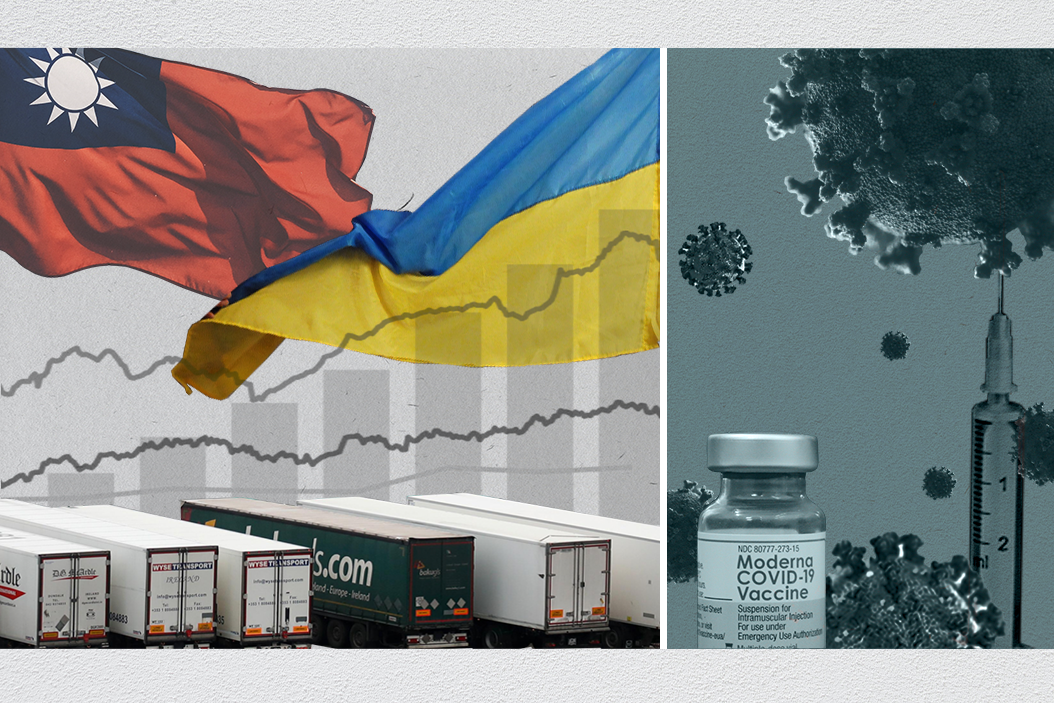Many of us, at least in the advanced economies, thought the pandemic would be over sometime in 2021. Vaccines worked, and a lot of people got them. Restrictions were relaxed, and things started to return to normal. But then came the virus variants, which threw a wrench into hopes of a speedy recovery. What'll happen next year?
Here are three things that could threaten the global post-COVID comeback.
The first major problem is more COVID variants, and how countries react to them.
Everyone's panicking now about omicron, which so far seems to be more contagious and more overpowering to vaccines than previous variants. It also seems, at least for now, to be less deadly – though if it spreads widely that could still mean a lot of deaths. Travel bans are back. Lockdowns could follow. Vaccine mandates will likely expand.
All of this is starting to feel like the darkest days of 2020 all over again — though the vaccines are likely to prevent similarly high death rates.
And even after omicron passes, we don't know what the next letter in the Greek alphabet will do. It’s possible that omicron could spread widely enough that it becomes the final big wave of the pandemic. But with nearly half the world still unvaccinated — and clear evidence that the disease can infect even the vaccinated — it’s also possible that new variants will emerge that pose fresh threats to the vaccinated and the unvaccinated alike.
That will raise, yet again, the thorny political questions about lockdowns, border closures, mandates, and remote learning. But after two years of first lockdowns and then vaccination campaigns, followed by fitful returns to normalcy later imperiled by new variants, the political backlash against fresh restrictions is sure to be even higher. How do we deal with another year of this?
The second big problem, a result of the first, is that COVID-related economic disruptions will continue.
The pandemic messed up global supply chains, which are still struggling to keep up with high demand. Delivery delays, higher shipping costs, and shortages of just about everything have become a huge headache for consumers and for governments, which can do little to fix the problem.
Supply-chain disruptions are the main factor driving soaring inflation around the world. Rising prices will make leaders in countries where inflation is going through the roof, like Brazil or Turkey, walk a tightrope between encouraging economic recovery and taking unpopular measures — like spending cuts or interest rate hikes — to fight inflation.
That economic frustration could, in turn, lead to anti-incumbent and anti-establishment rage at the ballot box. There are several big elections coming up next year where those in power will not be able to tell voters, “you're better off than before you elected me.”
Finally, there are two long-simmering geopolitical conflicts that got hotter this year, and could boil over in 2022.
First, Ukraine. Vladimir Putin has amassed 100,000 troops at the Ukrainian border because he doesn't want NATO to expand further into former Soviet territory. Putin has little to gain and much to lose from an actual invasion, but the risk of one is higher than it's been in at least seven years — that is, since the last time Putin invaded Ukraine.
Russia, the US, and Europe are playing a dangerous game of cat and mouse. If Putin overplays his hand, America could shut Russia out of the SWIFT, the cross-border payment network used by most banks worldwide. The Europeans, for their part, could cancel Russia’s Nordstream 2 pipeline, which would carry Russian gas that Europe depends upon keep homes warm.
Second, Taiwan. Xi Jinping has long aimed to “reincorporate” the self-governing island into the People’s Republic, but throughout 2021 China has been amping up the pressure by taunting the Taiwanese by air and sea. Meanwhile, the Biden administration has signaled that, after decades of deliberate ambiguity, it might in fact be prepared to actually defend Taiwan.
So, will China invade Taiwan next year? Almost surely not. Despite China’s growing military power, it would be a risky and immensely costly undertaking, particularly if the US does intervene, and it would almost certainly lead to crippling economic sanctions.
Still, Xi is keen to play up the nationalist card by talking big about Taiwan. With US-China relations quite frosty these days, and the Americans snooping around Taiwan as well, there’s always the risk of a miscalculation that blows up fast.- Biden's rocky first year - GZERO Media ›
- Why this COVID surge is different than 2020; behind Putin's threats - GZERO Media ›
- The myth of feeling safe from the pandemic: former CDC chief Tom Frieden - GZERO Media ›
- "Stunningly infectious" COVID demands better preparation, says Former CDC director - GZERO Media ›
